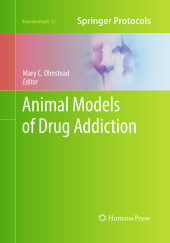 Neuerscheinungen 2016Stand: 2020-02-01 |
Schnellsuche
ISBN/Stichwort/Autor
|
Herderstraße 10
10625 Berlin
Tel.: 030 315 714 16
Fax 030 315 714 14
info@buchspektrum.de |

Mary C. Olmstead
Animal Models of Drug Addiction
Herausgegeben von Olmstead, Mary C.
Softcover reprint of the original 1st ed. 2011. 2016. xii, 484 S. 13 Tabellen. 254 mm
Verlag/Jahr: SPRINGER, BERLIN; HUMANA PRESS 2016
ISBN: 1-493-95745-7 (1493957457)
Neue ISBN: 978-1-493-95745-3 (9781493957453)
Preis und Lieferzeit: Bitte klicken
This book provides an up-to-date review of complex behavioral paradigms that model different stages of drug addiction and explain how each test is used to effectively replicate the progression of this disorder.
Our understanding of addiction and how it is treated has advanced remarkably over the past decades, and much of the progress is related directly to animal research. This is true for both the behavioural aspects of drug use as well as the biological underpinnings of the disorder. In Animal Models of Drug Addiction, experts in the field provide an up-to-date review of complex behavioural paradigms that model different stages of this disorder and explain how each test is used to effectively replicate the progression of drug addiction. This detailed and practical book begins with the most common laboratory measures of addiction in animals, including intracranial self-stimulation (ICSS), drug self-administration, place conditioning, and sensitization. Later chapters describe how these paradigms are used to model the progression of drug addiction, providing insight into the clinical symptomatology of addiction from acquisition of drug use through compulsive drug taking to withdrawal and relapse. Written for the popular Neuromethods series, the contributions offer both methodological detail and a theoretical perspective, appealing to readers familiar with preclinical research on drug addiction as well as those who are newcomers to the field.
Cutting-edge and authoritative, Animal Models of Drug Addiction will serve as a basis for future vital research that links the bench to the bedside in the crucial treatment of drug addiction.
Part I: Behavioral Paradigms
1. Intracranial Self-Stimulation
Styliani Vlachou and Athina Markou
2. Stimulant Self-Administration
Leigh V. Panlilio
3. Opiate Self-Administration
Francesco Leri
4. Nicotine Self-Administration
Robert E. Sorge and Paul B.S. Clarke
5. Alcohol Self-Administration
Friedbert Weiss
6. Place Conditioning
Christopher L. Cunningham, Peter A. Groblewski, and Charlene M. Voorhees
7. Sensitization
Jessica A. Loweth and Paul Vezina
8. Animal Models of Eating Disorders
Stephanie D. Hancock and Mary C. Olmstead
Part II: Modeling Stages of Drug Addiction in Animals
9. Acquisition of Drug Self-Administration
Marilyn E. Carroll and Richard A. Meisch
10. Escalation of Drug Use
Serge H. Ahmed
11. Environmental Modulation of Drug-Taking
Aldo Badiani , Daniele Caprioli, Arianna Testa, Maria Teresa De Luca, and Michele Celentano
12. Craving
Jeffrey W. Grimm
13. Habit Formation and Compulsion
David Belin, Daina Economidou, Yann Pelloux, and Barry J. Everitt14. Impulsivity
Andrea Bari, Trevor W. Robbins, and Jeffrey W. Dalley
15. Binge Drug-Taking
Herbert E. Covington III and Klaus A. Miczek
16. Withdrawal
Alasdair M. Barr, Heidi N. Boyda, and Ric M. Procyshyn
17. Relapse
Suzanne Erb and Franca Placenza


